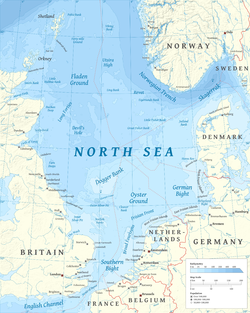| Action off Noordhinder Bank | |||||||
|---|---|---|---|---|---|---|---|
| Part of the First World War | |||||||
 North Sea map | |||||||
| |||||||
| Belligerents | |||||||
|
|
| ||||||
| Commanders and leaders | |||||||
|
|
| ||||||
| Strength | |||||||
|
4 naval trawlers 4 destroyers | 2 torpedo boats | ||||||
| Casualties and losses | |||||||
|
1 naval trawler sunk 1 naval trawler damaged 16 dead |
2 torpedo boats sunk 13 dead 46 captured | ||||||
North Sea | |||||||
The Action off Noordhinder Bank on 1 May 1915 was a naval engagement between four British naval trawlers, supported by a flotilla of four destroyers and a pair of German torpedo boats from the Flanders Flotilla. The action began when the two torpedo boats were sent to rescue the crew of a reconnaissance seaplane that had been forced to alight by engine trouble and to attack the trawlers. The Germans engaged the trawlers; British destroyers from the Harwich Force appeared; the German ships tried to escape but were sunk.
The loss of the two torpedo boats greatly demoralised the German flotilla at Flanders, as they were new. The loss of the two A-class torpedo boats showed the commanders of the Imperial German Navy (Kaiserliche Marine) that the Flanders Flotilla was inadequately armed to protect the coast, let alone harass British shipping in the English Channel. After similar defeats, the A-class torpedo boats were relegated to coastal patrol and heavier V25-class torpedo boats were transferred to the flotilla.
